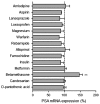Effects of 14 frequently used drugs on prostate-specific antigen expression in prostate cancer LNCaP cells
- PMID: 24765197
- PMCID: PMC3997723
- DOI: 10.3892/ol.2014.1936
Effects of 14 frequently used drugs on prostate-specific antigen expression in prostate cancer LNCaP cells
Abstract
Prostate cancer occurs more frequently among older males and such elderly individuals often have chronic underlying disorders for which various drugs are administered for treatment. The levels of prostate-specific antigen (PSA), a widely used prostate cancer marker, are influenced by a number of drugs, such as non-steroidal anti-inflammatory drugs and statins. In the present study, the drugs prescribed to patients on a repeat prescription collected at the pharmacy of the Gifu Pharmaceutical University (Gifu, Japan) were examined for their effects on the levels of PSA expression in prostate cancer LNCaP cells. Among the 14 drugs investigated, betamethasone, an agonist of the glucocorticoid receptor, was found to increase the levels of PSA mRNA expression in the LNCaP cells. This betamethasone-induced expression was mediated, at least in part, through androgen receptor (AR) transcriptional activation. Dexamethasone, a typical agonist of the glucocorticoid receptor, was also found to stimulate the AR transcriptional activity, however, to a lesser extent than betamethasone. Therefore, it would be interesting to examine in future studies whether the serum PSA levels in prostate cancer patients are influenced by betamethasone.
Keywords: LNCaP; betamethasone; prostate-specific antigen.
Figures



Similar articles
-
A novel regulation of PSMA and PSA expression by Q640X AR in 22Rv1 and LNCaP prostate cancer cells.Cell Biol Int. 2013 May;37(5):464-70. doi: 10.1002/cbin.10055. Epub 2013 Feb 18. Cell Biol Int. 2013. PMID: 23418075
-
Dissociation between androgen responsiveness for malignant growth vs. expression of prostate specific differentiation markers PSA, hK2, and PSMA in human prostate cancer models.Prostate. 2003 Mar 1;54(4):249-57. doi: 10.1002/pros.10199. Prostate. 2003. PMID: 12539223
-
Expression of prostate-specific antigen is transcriptionally regulated by genistein in prostate cancer cells.Mol Carcinog. 2002 Jun;34(2):91-101. doi: 10.1002/mc.10053. Mol Carcinog. 2002. PMID: 12112315
-
Interleukin-6 regulates androgen receptor activity and prostate cancer cell growth.Mol Cell Endocrinol. 2002 Nov 29;197(1-2):231-8. doi: 10.1016/s0303-7207(02)00263-0. Mol Cell Endocrinol. 2002. PMID: 12431817 Review.
-
Experimental evidence of persistent androgen-receptor-dependency in castration-resistant prostate cancer.Int J Mol Sci. 2013 Jul 26;14(8):15615-35. doi: 10.3390/ijms140815615. Int J Mol Sci. 2013. PMID: 23896594 Free PMC article. Review.
Cited by
-
The Effect of Metformin on Male Reproductive Function and Prostate: An Updated Review.World J Mens Health. 2022 Jan;40(1):11-29. doi: 10.5534/wjmh.210001. Epub 2021 Mar 9. World J Mens Health. 2022. PMID: 33831975 Free PMC article. Review.
-
An Ultra-Rapid Biosensory Point-of-Care (POC) Assay for Prostate-Specific Antigen (PSA) Detection in Human Serum.Sensors (Basel). 2018 Nov 8;18(11):3834. doi: 10.3390/s18113834. Sensors (Basel). 2018. PMID: 30413115 Free PMC article.
-
Association between body mass index and hemoglobin A1c with serum prostate-specific antigen level: A retrospective cohort study.Saudi Med J. 2023 Sep;44(9):870-874. doi: 10.15537/smj.2023.44.9.20230384. Saudi Med J. 2023. PMID: 37717968 Free PMC article.
-
Pirfenidone, an Anti-Fibrotic Drug, Suppresses the Growth of Human Prostate Cancer Cells by Inducing G₁ Cell Cycle Arrest.J Clin Med. 2019 Jan 4;8(1):44. doi: 10.3390/jcm8010044. J Clin Med. 2019. PMID: 30621175 Free PMC article.
-
The role of glucocorticoid receptor in prostate cancer progression: from bench to bedside.Int Urol Nephrol. 2017 Mar;49(3):369-380. doi: 10.1007/s11255-016-1476-8. Epub 2016 Dec 16. Int Urol Nephrol. 2017. PMID: 27987128 Review.
References
-
- Murad AS, Down L, Davey Smith G, et al. Associations of aspirin, nonsteroidal anti-inflammatory drug and paracetamol use with PSA-detected prostate cancer: findings from a large, population-based, case-control study (the ProtecT study) Int J Cancer. 2011;128:1442–1448. - PubMed
LinkOut - more resources
Full Text Sources
Other Literature Sources
Research Materials
Miscellaneous
